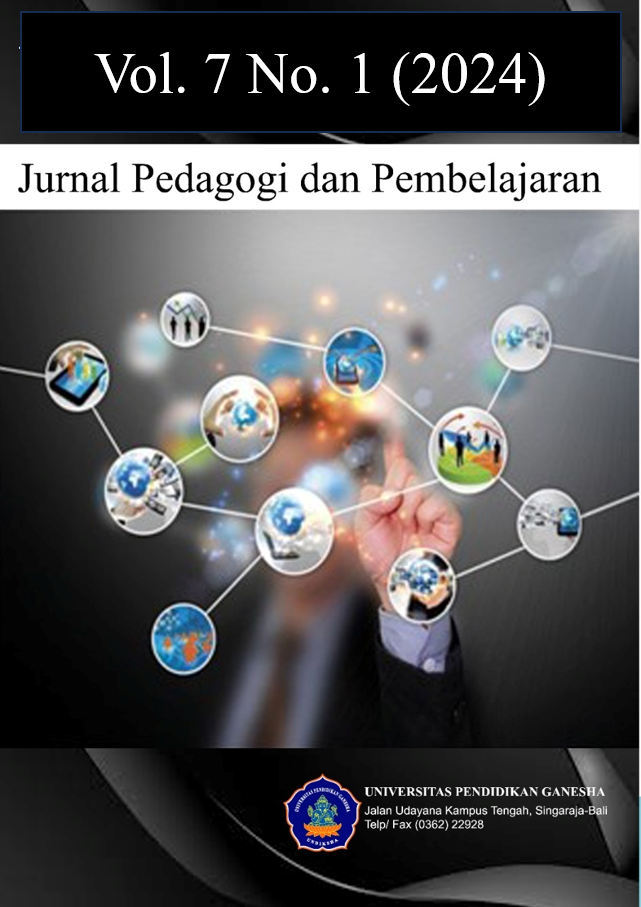Indonesian Language Training Management on Teacher Competency, Profession, and Social Affairs
DOI:
https://doi.org/10.23887/jp2.v7i1.68437Kata Kunci:
Training, Competency, Professional and Social ManagementAbstrak
Observation results showed that 42% of language teachers were satisfactory and 52% were unsatisfactory. Student achievement and exam results in Indonesian language lessons dropped drastically in 2016. Another fact is that of the 31,464 teachers, 83.89% were at the expected, satisfactory, weak, and very weak levels. This condition is urgent to research. The aim is to analyze the impact of competency management training on the knowledge and understanding of Indonesians, personally, professionally, and socially. Research method use in this study is descriptive survey. The population was selected using purposive sampling involving 210 out of 380 teachers from education throughout Indonesia. Data collection techniques is using questionnaires as the instrument. Statements in the questionnaire are constructed based on 2 standards, namely Knowledge and Understanding. Questions are asked to be rated on a 1-5 point Likert Scale. Instruments were distributed to human resources, namely teachers via Google. Analysis techniques with data statistics show percentages, standard deviations, and average scores, as well as describe relationships based on Pearson correlation statistics. The results show that the average knowledge and understanding score is (M = 4.51, SD = 0.39) among language teachers quite high. There is a relationship between the three domains (r = 0.178). The data also proves that there is a significant relationship between knowledge management training and understanding Indonesian with competence in three domains, namely personal, professional, and social domains.
Referensi
Anne Tansiongco, L., & Ibarra, F. (2020). Educational Leader’s Adversity Quotient, Management Style, and Job Performance: Implications to School Leadership. Indonesian Research Journal in Education |IRJE|, 4(2), 386–401. https://doi.org/10.22437/irje.v4i2.9264 DOI: https://doi.org/10.22437/irje.v4i2.9264
Arslan, A., Ahokangas, P., Haapanen, L., Golgeci, I., Tarba, S. Y., & Bazel-Shoham, O. (2022). Generational differences in organizational leaders: an interpretive phenomenological analysis of work meaningfulness in the Nordic high-tech organizations. Technological Forecasting and Social Change, 180(April), 121717.1-11. https://doi.org/10.1016/j.techfore.2022.121717 DOI: https://doi.org/10.1016/j.techfore.2022.121717
Bjørndal, C. R. P. (2020). Student teachers ’ responses to critical mentor feedback : A study of face-saving strategies in teaching placements. Teaching and Teacher Education, 91(May 2020), 103047.1-12. https://doi.org/10.1016/j.tate.2020.103047 DOI: https://doi.org/10.1016/j.tate.2020.103047
Cabrero, Chichon, M. and P. (2021). education sciences Literature. Education Sciences Models on Teaching Efcetiveness in Current Scientific, 11(5 August 2021), 1–18. https://doi.org/https://doi.org/10.3390/educsci11080409 DOI: https://doi.org/10.3390/educsci11080409
Davison, R. M., Ou, C. X., & Ng, E. (2020). Inadequate Information Systems and Organizational Citizenship Behavior. Information and Management, 57(6), 103240.1-25. https://doi.org/10.1016/j.im.2019.103240 DOI: https://doi.org/10.1016/j.im.2019.103240
Dinh, N. T., Dinh Hai, L., & Pham, H.-H. (2023). A bibliometric review of research on employability: dataset from Scopus between 1972 and 2019. Higher Education, Skills and Work-Based Learning, 13(1), 1–21. https://doi.org/10.1108/HESWBL-02-2022-0031 DOI: https://doi.org/10.1108/HESWBL-02-2022-0031
Dwivedi, Y. K., Hughes, D. L., Coombs, C., Constantiou, I., Duan, Y., Edwards, J. S., Gupta, B., Lal, B., Misra, S., Prashant, P., Raman, R., Rana, N. P., Sharma, S. K., & Upadhyay, N. (2020). Impact of COVID-19 pandemic on information management research and practice: Transforming education, work and life. International Journal of Information Management, 43(6). https://doi.org/10.1016/J.IJINFOMGT.2020.102211 DOI: https://doi.org/10.1016/j.ijinfomgt.2020.102211
González-Zamar, M. D., Abad-Segura, E., de la Rosa, A. L., & López-Meneses, E. (2020). Digital education and artistic-visual learning in flexible university environments: Research analysis. Education Sciences, 10(11), 1–20. https://doi.org/10.3390/educsci10110294 DOI: https://doi.org/10.3390/educsci10110294
Guan, Y., Deng, H., & Zhou, X. (2020). Understanding the impact of the COVID-19 pandemic on career development: Insights from cultural psychology. Journal of Vocational Behavior, 119(xxxx), 1–5. https://doi.org/10.1016/j.jvb.2020.103438 DOI: https://doi.org/10.1016/j.jvb.2020.103438
Ha, C. T., Thi, T., Thao, P., Trung, N. T., Thi, L., Huong, T., & Dinh, N. Van. (2020). A Bibliometric Review of Research on STEM Education in ASEAN : Science Mapping the Literature in Scopus Database , 2000 to 2019. Eurasia Journal of Mathematics, Science and Technology Education, 16(10), 1–11. https://doi.org/https://doi.org/10.29333/ejmste/8500 DOI: https://doi.org/10.29333/ejmste/8500
Horasan-Doğan, S., & Cephe, P. T. (2020). The effects of creative drama on student teachers’ creative pedagogy and identity. Thinking Skills and Creativity, 38(December 2020), 1–20. https://doi.org/10.1016/j.tsc.2020.100736 DOI: https://doi.org/10.1016/j.tsc.2020.100736
Huang, L., Zhang, T., & Huang, Y. (2020). Effects of school organizational conditions on teacher professional learning in China: The mediating role of teacher self-efficacy. Studies in Educational Evaluation, 66(May), 1-9. https://doi.org/10.1016/j.stueduc.2020.100893 DOI: https://doi.org/10.1016/j.stueduc.2020.100893
Imam, I., Ayubi, A., & Bernard, M. (2018). Pengaruh Pembelajaran Berbasis Masalah Terhadap Kemampuan Pemecahan Masalah Matematis Siswa SMA. JPMI:Jurnal Pembelajaran Matematika Inovatif, 1(3), 355–360. https://doi.org/10.22460/jpmi.v1i3.355-360 DOI: https://doi.org/10.22460/jpmi.v1i3.p355-360
Julius, R., Halim, M. S. A., Hadi, N. A., Alias, A. N., Khalid, M. H. M., Mahfodz, Z., & Ramli, F. F. (2021). Bibliometric Analysis of Research in Mathematics Education using Scopus Database. Eurasia Journal of Mathematics, Science and Technology Education, 17(12), 1–12. https://doi.org/10.29333/EJMSTE/11329 DOI: https://doi.org/10.29333/ejmste/11329
Kameshwara, K. K., Sandoval-Hernandez, A., Shields, R., & Dhanda, K. R. (2020). A false promise? Decentralization in education systems across the globe. International Journal of Educational Research, 104(May), 101669.1-15. https://doi.org/10.1016/j.ijer.2020.101669 DOI: https://doi.org/10.1016/j.ijer.2020.101669
Khojastehfar, S., Najafi Ghezeljeh, T., & Haghani, S. (2020). Factors related to knowledge, attitude, and practice of nurses in intensive care unit in the area of pressure ulcer prevention: A multicenter study. Journal of Tissue Viability, 29(2), 76–81. https://doi.org/10.1016/j.jtv.2020.02.002 DOI: https://doi.org/10.1016/j.jtv.2020.02.002
Kurdve, M., Bird, A., & Laage-Hellman, J. (2020). Establishing SME–university collaboration through innovation support programmes. Journal of Manufacturing Technology Management, 31(8), 1583–1604. https://doi.org/10.1108/JMTM-09-2018-0309 DOI: https://doi.org/10.1108/JMTM-09-2018-0309
Lawitta, R., Sihaloho, L., & Arianti, J. (2017). Vocational High School in Indonesia Facing ASEAN Economic Community (AEC). Advances in Social Science, Education and Humanities Research, 158, 950–957. https://doi.org/10.2991/ictte-17.2017.28 DOI: https://doi.org/10.2991/ictte-17.2017.28
Lee, S., Kim, D. H., & Chae, S. M. (2020). Self-directed learning and professional values of nursing students. Nurse Education in Practice, 42(January 2020), 102647.1-26. https://doi.org/10.1016/j.nepr.2019.102647 DOI: https://doi.org/10.1016/j.nepr.2019.102647
Mailizar, M., & Fan, L. (2020). Indonesian teachers’ knowledge of ICT and the use of ICT in secondary mathematics teaching. Eurasia Journal of Mathematics, Science and Technology Education, 16(1), 1–13. https://doi.org/10.29333/ejmste/110352 DOI: https://doi.org/10.29333/ejmste/110352
Mérida-López, S., & Extremera, N. (2020). When pre-service teachers’ lack of occupational commitment is not enough to explain intention to quit: Emotional intelligence matters! Revista de Psicodidáctica (English Ed.), 25(1), 52–58. https://doi.org/10.1016/j.psicoe.2019.05.001 DOI: https://doi.org/10.1016/j.psicoe.2019.05.001
Pellegrinelli, S., Murray-Webster, R., & Turner, N. (2015). Facilitating organizational ambidexterity through the complementary use of projects and programs. International Journal of Project Management, 33(1), 153–164. https://doi.org/10.1016/j.ijproman.2014.04.008 DOI: https://doi.org/10.1016/j.ijproman.2014.04.008
Phan, T. T., Do, T. T., Trinh, T. H., Tran, T., Duong, H. T., Trinh, T. P. T., Do, B. C., & Nguyen, T.-T. (2021). A Bibliometric Review on Realistic Mathematics Education in Scopus Database Between 1972-2019. European Journal of Educational Research, 11(2), 1133–1149. https://doi.org/10.12973/eu-jer.11.2.1133 DOI: https://doi.org/10.12973/eu-jer.11.2.1133
Robinson, S. C. (2020). Trust, transparency, and openness: How inclusion of cultural values shapes Nordic national public policy strategies for artificial intelligence (AI). Technology in Society, 63(November 2020,), 101421.1-38. https://doi.org/10.1016/j.techsoc.2020.101421 DOI: https://doi.org/10.1016/j.techsoc.2020.101421
Rodríguez, P. G., Villarreal, R., Valiño, P. C., & Blozis, S. (2020). A PLS-SEM approach to understanding E-SQ, E-Satisfaction and E-Loyalty for fashion E-Retailers in Spain. Journal of Retailing and Consumer Services, 57(December 2019), 1–8. https://doi.org/10.1016/j.jretconser.2020.102201 DOI: https://doi.org/10.1016/j.jretconser.2020.102201
Sanchez, J., Maiden, J., Barton, E., Walters, L., Quinn, D., Jones, N., Doyle, A. K., & Lim, D. (2023). Factors that sustain indigenous youth mentoring programs: a qualitative systematic review. BMC Public Health, 23(1), 1–15. https://doi.org/10.1186/s12889-023-15253-2 DOI: https://doi.org/10.1186/s12889-023-15253-2
Scerri, M., Presbury, R., & Goh, E. (2020). An application of the mentoring framework to investigate the effectiveness of mentoring programs between industry mentors and student mentees in hospitality. Journal of Hospitality and Tourism Management, 45(July), 143–151. https://doi.org/10.1016/j.jhtm.2020.08.010 DOI: https://doi.org/10.1016/j.jhtm.2020.08.010
Schunk, D. H., & DiBenedetto, M. K. (2020). Motivation and social cognitive theory. Contemporary Educational Psychology, 60, 101832. https://doi.org/10.4103/0019-5154.182410. DOI: https://doi.org/10.1016/j.cedpsych.2019.101832
Sembiring, R., Hadi, S., & Dolk, M. (2008). Reforming mathematics learning in Indonesian classrooms through RME. ZDM, 40, 927–939. https://doi.org/10.1007/s11858-008-0125-9 DOI: https://doi.org/10.1007/s11858-008-0125-9
Setyowati Ciptaningrum, D. (2017). The Development of the Survey of Technology Use, Teaching, and Technology-Related Learning Experiences among Pre-Service English Language Teachers in Indonesia. Journal of Foreign Languange Teaching and Learning, 2(2), 11–26. https://doi.org/10.18196/ftl.2220 DOI: https://doi.org/10.18196/ftl.2220
Sokal, L., Trudel, L. E., & Babb, J. (2021). I’ve had it! Factors associated with burnout and low organizational commitment in Canadian teachers during the second wave of the COVID-19 pandemic. International Journal of Educational Research Open, 2(1), 100023.1-9. https://doi.org/10.1016/j.ijedro.2020.100023 DOI: https://doi.org/10.1016/j.ijedro.2020.100023
Supriadi, Udin; Supriyadi, Tedi; Abdussalam, Aam; Rahman, A. A. (2020). A Decade of Value Education Model: A Bibliometric Study of Scopus Database in 2011-2020. European Journal of Educational Research, 9(4), 1635–1647. https://doi.org/10.12973/eu-jer.9.4.1635 DOI: https://doi.org/10.12973/eu-jer.9.4.1635
Tang, Y. M., Chen, P. C., Law, K. M. Y., Wu, C. H., Lau, Y. yip, Guan, J., He, D., & Ho, G. T. S. (2021). Comparative analysis of Student’s live online learning readiness during the coronavirus (COVID-19) pandemic in the higher education sector. Computers and Education, 168(April). https://doi.org/10.1016/j.compedu.2021.104211 DOI: https://doi.org/10.1016/j.compedu.2021.104211
Thees, M., Kapp, S., Strzys, M. P., Beil, F., Lukowicz, P., & Kuhn, J. (2020). Effects of augmented reality on learning and cognitive load in university physics laboratory courses. Computers in Human Behavior, 108(July 2020), 106316.1-11. https://doi.org/10.1016/j.chb.2020.106316 DOI: https://doi.org/10.1016/j.chb.2020.106316
Twito, L., & Knafo-Noam, A. (2020). Beyond culture and the family: Evidence from twin studies on the genetic and environmental contribution to values. Neuroscience and Biobehavioral Reviews, 112(November 2019), 135–143. https://doi.org/10.1016/j.neubiorev.2019.12.029 DOI: https://doi.org/10.1016/j.neubiorev.2019.12.029
Wan Mazwati Wan Yusoff, Shamilati Che Seman, R. E. (2017). Exploring Primary School Teachers ’ Language of Thinking : A Case Study Bahasa Berfikir Guru Sekolah Rendah : Satu Kajian Kes Introduction Human being is endowed with a vital spiritual ( immaterial ) organ that is capable of conceptualizing and retaining. Journal Of Islam In Aisa Sepcial Issue Islam and Creativity, 14(3), 271–295. https://doi.org/https://doi.org/10.31436/jia.v14i3.633 DOI: https://doi.org/10.31436/jia.v14i3.633
Zein, S., Sukyadi, D., Hamied, F. A., & Lengkanawati, N. S. (2020). English language education in Indonesia: A review of research (2011-2019). Language Teaching, 53(4), 491–523. https://doi.org/10.1017/S0261444820000208 DOI: https://doi.org/10.1017/S0261444820000208
Unduhan
Diterbitkan
Cara Mengutip
Terbitan
Bagian
Lisensi
Hak Cipta (c) 2023 Risma Risma Uly Manalu

Artikel ini berlisensiCreative Commons Attribution-ShareAlike 4.0 International License.
Authors who publish with Jurnal Pedagogi dan Pembelajaran agree to the following terms:- Authors retain copyright and grant the journal the right of first publication with the work simultaneously licensed under a Creative Commons Attribution License (CC BY-SA 4.0) that allows others to share the work with an acknowledgment of the work's authorship and initial publication in this journal
- Authors are able to enter into separate, additional contractual arrangements for the non-exclusive distribution of the journal's published version of the work (e.g., post it to an institutional repository or publish it in a book), with an acknowledgment of its initial publication in this journal.
- Authors are permitted and encouraged to post their work online (e.g., in institutional repositories or on their website) prior to and during the submission process, as it can lead to productive exchanges, as well as earlier and greater citation of published work. (See The Effect of Open Access)










